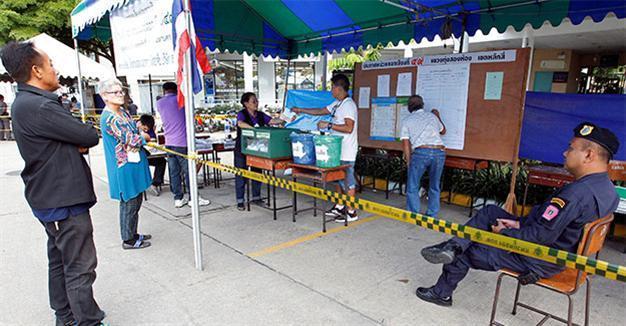Thai voters overwhelmingly approve junta-backed constitution
BANGKOK

An election commission official displays a ballot paper to the media while counting votes during a constitutional referendum vote at a polling station in Bangkok, Thailand, August 7, 2016. REUTERS photo
Thai voters on Aug. 7 overwhelmingly approved a new junta-backed constitution that lays the foundation for a civilian government influenced by the military and controlled by appointed - rather than elected - officials.
Although near-final results showed that more than 60 percent of voters in a referendum called by the military government approved of the constitution, the vote is likely to be met by some skepticism. The junta - led by Prime Minister Prayuth Chan-ocha, a retired army general who has severely curtailed dissent since coming to power in a 2014 coup - imposed severe restrictions on public discussion of the proposed constitution.
Ahead of the referendum, the junta banned political rallies and open discussion about the constitution, and criticism of the draft was made punishable by 10 years in jail. Critics say the restrictions ensured that most people were unaware of the pitfalls of the charter, and were probably anxious to get the long-drawn process over with so that they could move on.
The “yes” vote “adds that touch of legitimacy to the coup makers,” Pavin Chachavalpongpun, an associate professor at the Center for Southeast Asian Studies of Kyoto University in Japan, told The Associated Press.
“It gives them the green light for the next few steps they want to take. They will say the opposition cannot say anything now,” said Pavin, who is Thai and is a vocal critic of the junta.
Prayuth’s office, however, said in a statement late Sunday that the referendum “was conducted with a high degree of transparency and openness on part of the government.”
Chatchai Na Chiang Mai, spokesman for the Constitution Drafting Committee, said that a democratically elected government will take power in Thailand at the earliest by December 2017.
“We think there will be an election at the earliest in September or October 2017 and a new government by December 2017,” the spokesman told Reuters.
Yingluck Shinawatra, the ousted prime minister with a coup in 2014, said a social media post that she “accept the decision of the people.”
“I am saddened by the fact that our country is going backwards to an undemocratic constitution,” she was quoted as saying by AFP, adding that she was “not surprised” at the result due to the bar on debating the document.
